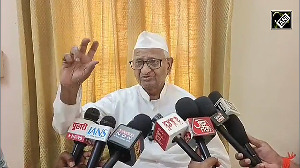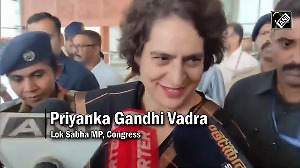United States President Barack Obama's visit to Mumbai and New Delhi has generated much discussion in the Indian press.
A great deal of the commentary has focused on India's expectations from this visit. The list of Indian concerns is long: From greater counter-terrorism cooperation to questions on US weapons sales to Pakistan, timely intelligence sharing, the future of the American role in Afghanistan and hopes for explicit US support for a permanent United Nations Security Council seat.
Lost amidst this understandable cacophony of voices that have spelled out India's hopes and concerns is any serious attention to what India might be able to offer the US as it seeks to strengthen the strategic partnership.
This inattention to what India might be able to bring to this emerging strategic relationship is a matter that cannot be left unaddressed. Far too much is at stake for both sides.
Consequently, it might be useful to focus on at least four distinct areas where India could proffer Obama important reasons to bolster the growing bonds between the two countries.
One vital area is defence cooperation. Unfortunately, it appears that at least two service chiefs as well as the defence ministry have expressed their doubts about signing two key agreements dealing with access to India's military facilities and with matters of interoperability.
Bluntly put, the timing of this announcement could not have been worse given that the presidential visit is imminent. However, all may not be lost. If some doubts and anxieties related to these can be dealt with during the visit and shortly thereafter, it may still be possible for India to move forward with these two agreements.
In their absence, the prospects of deepening and widening Indo-US defence cooperation will remain in abeyance.
Beyond these agreements, it might also be useful if India could finally reach a swift decision on the future purchase of the Medium Multi-Role Combat Aircraft. Allowing this decision to languish long after the Indian Air Force has offered its technical assessment of the aircraft in competition makes little or no strategic sense. Especially because the air force is now operating with an increasingly obsolescent and unsafe fleet.
The possible deal would amount to a multi-billion-dollar defence contract and at least two American aircraft manufacturers are vying for it. There is obviously no dearth of potential suppliers for such aircraft.
However, it needs to be firmly underscored that the US aerospace industry still retains a vital edge in terms of the sophistication.
Accordingly, while India may wish to drive a hard bargain to obtain the best possible terms both in terms of technology and costs it may also be in its self-interest to forge a long-term relationship with the US in this critical sector.
As India seeks American support against Pakistan-aided terrorism it might consider addressing American security concerns around the Indian Ocean littoral. To that end India should prove willing to expand the band of existing naval cooperation to ensure the freedom of navigation of the sea-lanes that are vital to commercial traffic.
This is an arena where India and the United States have cooperated effectively in the past. There is little reason why they cannot broaden their existing commitments.
Beyond the strategic aspects of the relationship, India should jump-start the process of economic liberalisation, which, at present, appears to have stalled. Again, self-interest suggests it may be desirable to do so.
American investment in a host of Indian industrial, service and other sectors brings the promise of new technologies, better products and improved services. Both the National Democratic Alliance and the United Progressive Alliance regimes have dragged their feet on opening up the multi-brand retail sector.
This is an area that could benefit from some policy shift. Progress has stalled because of specious claims that small shopkeepers would be forced out of business. The real issue, however, is opposition from large Indian conglomerates, who fear the entry of more efficient American firms.
In the interests of the Indian consumer it may now be the time to stand up to the dubious opposition and allow the entry of multi-brand retail stores.
Finally, India has taken an important step in signing the Convention on Supplementary Compensation to deal with possible liability issues arising from civilian nuclear accidents.
However, the Obama administration has continued to express concerns about the congruence of the expectations of this agreement with those embedded in Indian domestic legislation.
Simply brushing off the stated American concerns on the grounds that India believes that the domestic legislation conforms to the expectations of the CSC will not suffice. Nor will the argument that the existing legislation cannot be amended really carry the day.
Instead India's policymakers would be wise to find possible means to forthrightly address American misgivings. Both the Bush and Obama administrations expended significant amounts of political capital in the domestic and the international arenas to ensure that the civilian nuclear agreement was duly consummated.
Consequently, it is hardly unreasonable for the current administration to expect that American firms might be able to enjoy the benefits of investment in India's nuclear industry without undue concerns about legal liability.
After years of mutual neglect and occasional tensions, Indo-US relations are now at a cusp. Unlike in the past when the relationship lacked substance, today it has diplomatic, strategic and commercial significance.
That said, there are legitimate differences of interest and important policy disagreements. Those, however, should not be allowed to retard the very dramatic progress that has been made within the past decade.
Since the waning days of the Clinton administration the Indo-US relationship has steadily acquired increased ballast and has enjoyed increased depth. India's policymakers need to set aside past fears and temporary disagreements to focus on strengthening the foundations of this very sound and important relationship.
President Obama's first visit to India offers a vital opportunity to do so.
Professor Sumit Ganguly teaches political science at Indiana University, Bloomington. He is a distinguished visiting fellow at the Institute of Defence Studies and Analyses, New Delhi.











 © 2025
© 2025